#the prequels as tragedy
Text
Dystopian themes in the Prequels
“Looking back is helpful in understanding his work. Lucas started out in the 1960’s as an experimental filmmaker heavily influenced by the avant-garde films of the San Francisco art scene. Initially interested in painting, he became an editor and visualist who made abstract tone poems. His first feature, THX 1138 (1971) was an experimental science fiction film that presented a surreal, underground world where a dictatorial state controls a docile population using drugs. Love and sex are outlawed, procreation is controlled through machines, and human beings shuffle meaninglessly around the system.”
—Anthony Parisi, 'Revisiting the Star Wars Prequels'
The bolded parts in this description correspond with the Coruscant Underworld, the Jedi Order’s code, and the creation of the clone troopers, respectively.
Notably, in THX 1138's setting, emotions such as love and the concept of family are taboo:

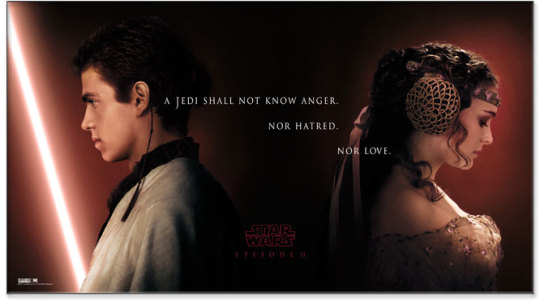
I’ve always found it so interesting that Lucas incorporated the dystopian elements of his earlier sci-fi into the Prequels, taking place as they do in the context of the final years of the Repubic, with all its colourful and sumptuous visual spendour. In comparison, the post-apocalyptic ‘Dark Times’ of the Original Trilogy would seem on the surface to be the more outwardly ‘dystopian’ setting of the two—however, the actual story of the OT is a mythic hero's journey and fairytale, complete with an uplifting and transcendent happy ending. The OT's setting may be drained of colour, and its characters may be living under the shadow of the Empire, but as a story it is far from bleak or dystopian in tone. Rather, fascinatingly, it is the pre-apocalyptic era of the Prequels that is presented as the more dystopian storyline:
“On the surface, [The Phantom Menace] is an optimistic, colorful fantasy of a couple of swashbuckling samurai rescuing a child Queen and meeting a gifted slave boy who can help save the galaxy from the slimy Trade Federation and its Sith leaders. But beneath that cheerful facade is a sweatshop of horrors.”
—Michael O'Connor, 'Moral Ambiguity: Beyond Good and Evil in the Prequels'
This is referring to the state of the galaxy during the Prequels era, including the fact that slavery is known to exist, but is largely ignored by the Republic and the Jedi alike due to being too economically inconvenient to combat. It also refers to how the Jedi of the Old Order come across as cold and distant atop their ivory tower on the artificial world of Coruscant, far removed not only from the natural world but also from the true realities of the people they claim to serve. And then there is the additional revelation in Attack of the Clones that love and family are 'outlawed' within the Jedi Order, creating an environment in which their own 'Chosen One' is unable to flourish, leaving him vulnerable to the Dark Side. Finally, there's the fact that the characters end up so distracted by fighting a civil war (something that goes against their own principles and involves the use of a slave clone army in the process), that they are blinded to the entity of pure evil that is guiding their every move...until it is too late.
“Without a clear enemy, the Jedi Order, the Galactic Senate, the whole of the Star Wars galaxy bickers and backstabs and slides around the moral scales. But there is one benefit to Palpatine’s pure evil crashing down upon the galaxy; against its oppressive darkness, only the purest light can shine through.”
—Michael O'Connor, 'Moral Ambiguity: Beyond Good and Evil in the Prequels'
If anything, the Dark Times allows for the OT generation's acts of courage and heroism to flourish and succeed, because they are not hampered by the Old Jedi Order's restrictive rules, nor by its servitude to the whims of an increasingly corrupt Republic—so corrupt, in fact, that by the time of RotS, it is practically the Empire in all but name. Indeed, one of the key features of the Prequels, and what makes them so tragic, is that the characters are already living in a dystopia...they just don't know it.
There is, paradoxically, a level of freedom to be found in the midst of the Dark Times which had not been possible during the Twilight era, which allows Original Trio to rise above the tragedy that befell their predecessors. They are able to act as free agents (not as slaves of a corrupt government), serving only the fight for the liberation of all the peoples of the galaxy (not just citizens of the Republic), and are likewise free to live (and love!) on their own terms. Free to act on their positive attachments to one another, without having to hide the truth of their feelings. It's particularly telling that *this* is, above all, what makes the Prequels era so dystopian—the characters' inability to freely and openly participate in normal familial human relationships.
#the prequels#original trilogy#pt x ot#the skywalker saga#the real skywalker saga#lucas' saga#lucas' influences#THX 1138#the twilight of the republic#vs#the Dark Times#the jedi order#jedi discourse#Prequels appreciation#the prequels era as dystopia#the prequels as tragedy#the original trilogy as fairytale#original trilogy era as fairytale#slavery vs. freedom#the dark is generous and it is patient and it always wins#but it is also the context in which the light shines more brightly
154 notes
·
View notes
Text

yeah, you'll burn in hell
for your sins
(4k version)
#insp: take a bow by muse#anakin skywalker#darth vader#star wars#my art#prequels#star wars prequels#the tragedy of anakin skywalker
3K notes
·
View notes
Text





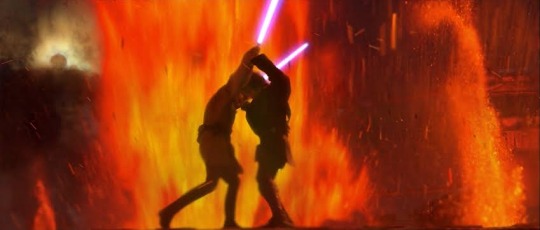





obi-wan & anakin: you are cain and he is abel and this is how it always ends
[star wars: episode iii - revenge of the sith novelisation // star wars: episode i - the phantom menace (1999) // john darnielle // star wars: episode ii - attack of the clones (2002) // dante émile, 'after abel' // star wars: episode iii - revenge of the sith (2005) // rosanna warren, gods and mortals: modern poems on classical myths, 'turnus' // obi-wan kenobi (2022) 1x06 // richard siken, 'planet of love' // star wars: episode iv - a new hope (1977) // richard siken, 'war of the foxes']
#tragedy#the narrative#doomed by the narrative#brothers#anakin skywalker#obi-wan kenobi#poetry#star wars#prequels#kenobi series#web weave#web weaving#webweaving#my stuff#obi-wan & anakin#sibling dynamics make me insane go figure#thicker than water
2K notes
·
View notes
Text
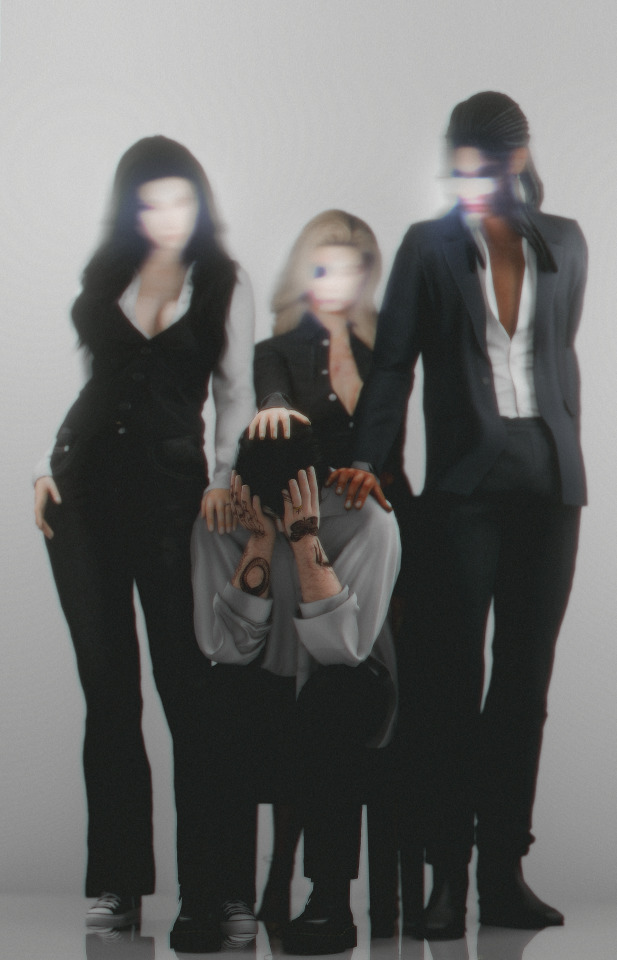
was there one you saw too clearly
did they seem too real to you?
they were kids that i once knew,
they were kids that i once knew.
#ts4#the sims 4#simblr#ts4 render#show us your sims#deja senti b sides: edits#altho i could technically tag this as prequel#jay#AUDREY#REX#yeah lol#also#sunny#yall dont know anything about sunny but jay met her when he went back to the city they got married and had the twins when they were both#still pretty young and then tragedy#but also . his ring is a different color than her's and thats#hmm!#audrey be like small
225 notes
·
View notes
Text
i think the reason that i find the tragedy of the prequels so compelling is that anakin is such a good tragic hero. he's shown to be an intelligent man with a mature understanding of the world, who made catastrophic choices on purpose because they were easier and more personally satisfying to him. when fans deny him that agency, i believe they misunderstand the story in important ways. one can say that he was manipulated and deceived, one can diagnose him with every mental illness in the DSM (and people in my notes often do), but one cannot say that he wasn't fast to toss aside his moral values to lash out and to get what he wanted.
the fact of the narrative is that anakin knew better, and he chose the easy option (with full knowledge that it was 'wrong'), because he refused to accept core limitations of reality, namely the inevitability of death. he thought that having special powers meant the rules didn't apply to him and those he loved, and that's how he ended up killing kids and serving as a fascist enforcer for decades. one can contort themselves into knots to try to excuse that, and there were indeed many contextual forces that gave him so much power in the first place, but there is no real excuse for what he chose to do with that power.
without anakin being that kind of moral agent, there is no tragedy. tragedy in an aristotelean sense is a narrative designed to elicit feelings of pity and fear, because we the audience know that we too are doomed to suffer and all too readily make easy, bad choices to avoid pain. none of us want to accept that some parts of life include losing, and require sacrifice. anakin's greed was his undoing, as it is all to often our own. refusing to accept that the tragedy of the prequels, explaining away and excusing the fall of the hero, means protecting ourselves from accepting the painful truth that we are just like him, and can and do make the same kind of mistakes.
#the prequels are not history. they are tragedy#the fall of a kind and generous man#into becoming darth vader#trying to escape the tragedy means not engaging with the text#not letting the text touch you#which is a shame#darth vader#anakin skywalker#sw#this is a vague post but directed about 30 or 40 people lol at least so#at that point does it even count as one#who knows#not me!
615 notes
·
View notes
Text
Anakin was crying when he told Padme that he genocided the Tuskens. He told her he hated them but he also hated himself.
Star wars is a tragedy because every time you watch it, you think maybe in the back of your mind " it could have been otherwise".Anakin was brilliant and had the potential to be a great person but ended up being one of the worst ones. And he knew it too deep down in his heart but suppressed it as Darth Vader.
Yoda said once you go down the dark path, it will forever dominate your destiny. Anakin believed that there was no coming back. Of course, both omitted the power of love, a power both predictable and unpredictable at the same time.
#star wars#anakin skywalker#Darth Vader#dark force#Yoda#sand people#Lord Vader#padme amidala#queen amidala#senator amidala#luke skywalker#master yoda#light force#jedi#sith#star wars analysis#tragedy#star wars meta#skywalker#sw prequels#anakin x padme#power of love#genocide
258 notes
·
View notes
Note
I like to imagine that Palpatine has two different accounts, one for Sheeve Palpatine and one for Darth Sidious. I don't know why Darth Sidious would need a holonet account but I think it would be funny if one time he accidentally posted something on the wrong account and ratted himself out and than tried to play it off like his account got hacked or something
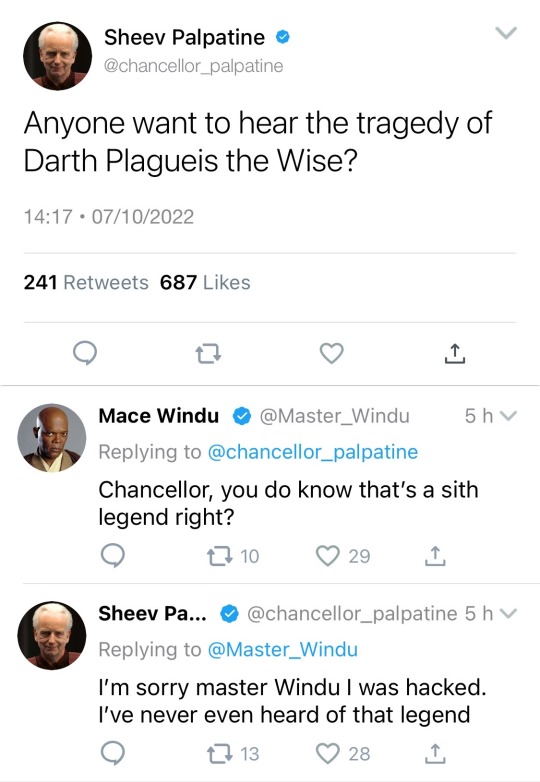
-
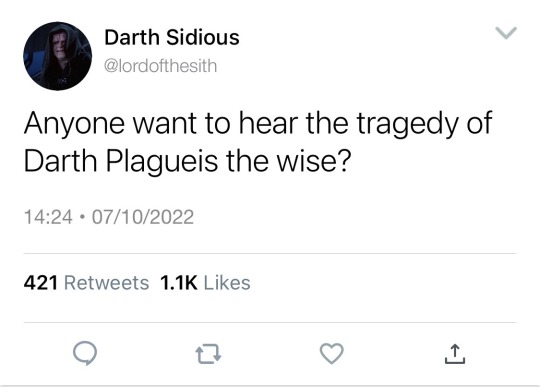
I’ve had this in my ask box way to long and I finally made it
#star wars#social media#twitter#prequel trilogy#mace windu#sheev palpatine#darth sidious#the tragedy of darth plagueis the wise#darth plagueis
2K notes
·
View notes
Text
I think I realized what is giving me such frisson about Sifo-Dyas's whole last words/final transmission to the Temple thing.
It's the fact of a prequel character, in an era that is so much about inevitable narrative doom, cynicism, and corruption from within, looking straight into the camera and earnestly saying "I've done my best."
Like. It didn't work. But I don't know, there's something really beautiful about that moment.
#and I understand Sifo's compulsion I mean who of us isn't sitting on an incomplete prequels fix-it AU#yes I'm still on about this#sifo dyas#star wars meta#⛏️⛏️⛏️#the prequels are all about people trying to save their world and failing#and sifo-dyas has arguably one of the worst hands anyone in the series was dealt#real Cassandra vibes to go back to greek tragedy
89 notes
·
View notes
Text
i don’t want a 50th Hunger Games prequel book i want the 51st Hunger Games. I want Haymitch’s first attempt at mentoring while grieving over his family and friends, feeling betrayed by the Capitol. Knowing that 12’s tributes haven’t got a single chance and he’s going to be witnessing them die every single year. Haymitch realising he’s still stuck on the Capitol train.
#asking for a prequel 50th HG would just feel like a rehashing the 51st gives us mentoring and tragedy and some 50th flashbacks#plus we could see chaff and mags and the other victors and stuff#and more panem worldbuilding anf the evolution of it and thr games#the hunger games#the ballad of songbirds and snakes#haymitch abernathy
344 notes
·
View notes
Text
Something I just noticed while reading Brotherhood is that it completely debunks the entire “the Jedi used child soldiers” argument in a single line (not that that was an argument anyone actually took especially seriously).
Palpatine was the one who called for it. It literally says that almost verbatim. Shockingly, the man who set up the Jedi to look bad for so many other reasons and backed them into a corner when it came to actually joining the war and fighting alongside the clones is ALSO responsible for forcing the Jedi to use their Padawans.
It’s almost like the guy in the black cloak who evil laughs when he hurts people and secretly plotted to become the dictator of an entire galaxy and wipe out cultures and races that oppose his way of life is the bad guy? Not the Jedi?
#if the movie plays sad music when showing you a montage of a dozen characters being killed off it means you’re supposed to be sad#Order 66 was objectively a tragedy#this really shouldn’t need to be said#pro jedi#sw#star wars prequels#star wars#palpatine
371 notes
·
View notes
Text




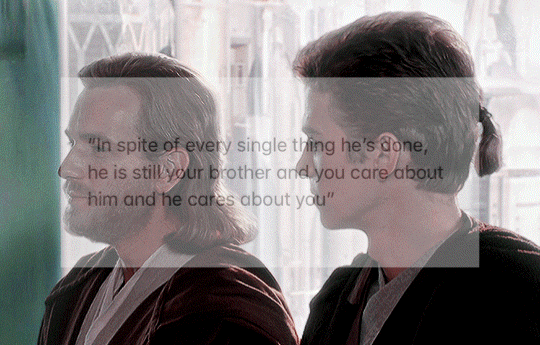
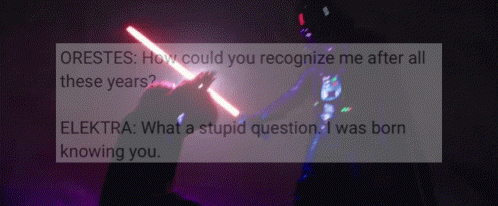

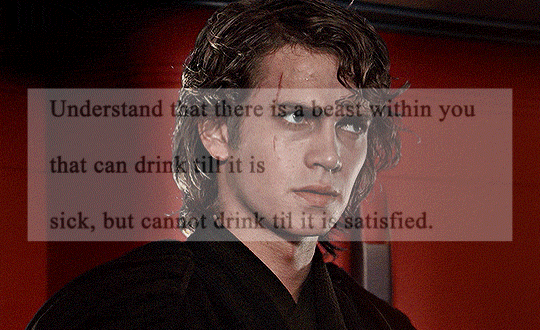

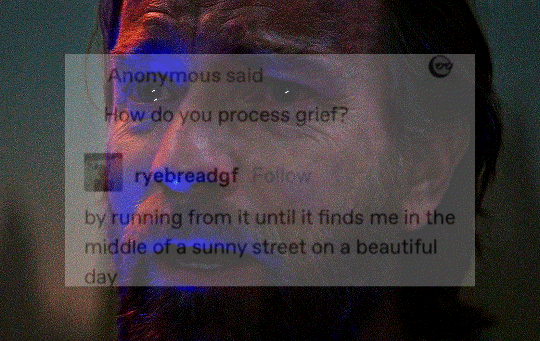
“The man he faced was everything Obi-Wan had devoted his life to destroying: Murderer. Traitor. Fallen Jedi. Lord of the Sith. And here, and now, despite it all.
Obi-Wan still loved him.”
#ohhhh the tragedy#it’s too much sometimes#star wars#star wars prequels#star wars attack of the clones#star wars aotc#sw aotc#star wars revenge of the sith#star wars rots#sw rots#kenobi tv#kenobi series#obi wan kenobi#anakin skywalker#darth vader
315 notes
·
View notes
Text
On Lucas' saga, Joseph Campbell, and mythopoesis
Mythopoeia (Ancient Greek: μυθοποιία, lit. 'myth-making')—or mythopoesis—is a narrative genre in modern literature and film where an artificial or fictionalised mythology is created by the writer of prose, poetry, or other literary forms. This definition follows the use of the word by J. R. R. Tolkien in the 1930s. The authors in this genre integrate traditional mythological themes and archetypes into fiction. Mythopoeia can also refer to the act of 'myth-creation' itself.
A compilation of quotes on Lucas' Star Wars and how it was directly influenced by Joseph Campbell's mythopoeic concepts. I'm sharing these here mostly for my own reference purposes, but also because I feel it's important for people to remember that the saga in its original form was intended to function as a modern myth. And as such, it was not meant to be 'realistic' in its outcome, but rather transcendent.
Quotes on Lucas' saga as a 'created myth':
"With his galactic fairytale, Lucas hoped to reinvent a classic genre. Among his influences, were the writings of scholar and educator Joseph Campbell, in which he explored the origins of myth and world religions."
— Robert Clotworthy, Empire of Dreams (2004)
"What Joseph Campbell was interested in, was to see the connections between myths, the myths of different cultures, to try to find out what were the threads that tied all these very disparate cultures together."
— Professor and Cultural Historian Leo Braudy, Empire of Dreams (2004)
"Lucas, too, was interested in [comparative mythology], in particular when creating Star Wars. Lucas actually asked Campbell to supervise his work on Star Wars, to be sure it fit with what he was trying to convey. Campbell, in turn, described Lucas as his best student. This is truly the crux of the matter. What Lucas was attempting to accomplish was the writing a modern myth, following conventional, thousand year old methods, all the while having it be relevant, fluid, cross-culturally and generationally meaningful."
— Star Wars: The Creation of a Modern Myth
"I did research to try to distill everything down into motifs that would be universal. I attribute most of the success of to the psychological underpinning, which had been around for thousands of years and the people still react the same way to the stories as they always have."
— George Lucas
"From the beginning, Star Wars was conceptualized not as a science fiction film, but as a mythical epic, consistent with those of poetic eddas, from Beowulf to the Iliad and the Odyssey. In Empire of Dreams, these are cited as influences, as well as the Legend of King Arthur, and other assorted Arthuriana, determining that they comprised the pool from which Star Wars drew it’s mythic archetypes."
— Star Wars: The Creation of a Modern Myth
"...Lucas speaks of the cinematic storyline of Star Wars as an example of modern myth-making. In 1999 he told Bill Moyers, "With Star Wars I consciously set about to re-create myths and the classic mythological motifs." [Frank] McConnell writes that "it has passed, quicker than anyone could have imagined, from the status of film to that of legitimate and deeply embedded popular mythology."John Lyden, the Professor and Chair of the Religion Department at Dana College, argues that Star Wars does indeed reproduce religious and mythical themes; specifically, he argues that the work is apocalyptic in concept and scope."
— Mythopoeia (Wikipedia)
"[Lucas] drew from ancient mythology, medieval literature, Japanese cinema, and American westerns, creating a modern myth in the form of a sci-fi fairy tale."
— Anthony Parisi, 'Revisiting the Star Wars Prequels'
"The six films form one larger epic that is constructed like a piece of music....built on archetypal themes and psychological motifs that reverberate throughout the six episodes."
— Anthony Parisi, 'Revisiting the Star Wars Prequels'
"The saga has religious sensibilities that stand in marked contrast to the secular moods of science fiction. Gene Roddenberry’s Star Trek followed an Enlightenment view of history where religion is left behind as humanity arrives at a benevolent utopia. Luke Skywalker’s journey is precisely the opposite, where the hero must reach back to recover the spiritual traditions of the past and save the galaxy."
— Anthony Parisi, 'Revisiting the Star Wars Prequels'
"...the moral drama at the heart of these six films has proven to be quite exceptional. The story is entirely centered around the fall and redemption of the human soul."
— Anthony Parisi, 'Revisiting the Star Wars Prequels'
"...Star Wars is not a futuristic world, it is a mythological one. Star Wars happened a long time ago, so it is more mythology than science fiction. Consequently, what we design doesn't have to make scientific sense, but it must spark some recognition of with a familiar mythological archetype."
— Iain McCaig, Myth Making: Behind the Scenes of Attack of the Clones
Joseph Campbell quotes on 'myth' (applicable to Lucas' saga):
"Myth must be kept alive. The people who can keep it alive are the artists of one kind or another. The function of the artist is the mythologization of the environment and the world."
— Joseph Campbell, The Power of Myth
"One thing that comes out of myths is that at the bottom of the abyss comes the voice of salvation. The black moment is the moment when the real message of transformation is going to come. At the darkest moment comes the light."
— Joseph Campbell, The Power of Myth
"Perhaps some of us have to go through dark and devious ways before we can find the river of peace or the highroad to the soul's destination."
— Joseph Campbell, The Hero With A Thousand Faces
"Death closes in; there is nothing we can do, except be crucified—and resurrected; dismembered totally, and then reborn."
— Joseph Campbell, The Hero With A Thousand Faces
"The usual hero adventure begins with someone from whom something has been taken, or who feels there is something lacking in the normal experience available or permitted to the members of society. The person then takes off on a series of adventures beyond the ordinary, either to recover what has been lost or to discover some life-giving elixir. It's usually a cycle, a coming and a returning."
― Joseph Campbell, The Hero With a Thousand Faces
"The hero…for a moment rises to a glimpse of the source. He beholds the face of the father, understands—and the two are atoned…. For the son who has grown really to know the father, the agonies of the ordeal are readily borne; the world is no longer a vale of tears but a bliss-yielding, perpetual manifestation of the Presence."
—Joseph Campbell, The Hero With a Thousand Faces
"Furthermore, we have not even to risk the adventure alone, for the heroes of all time have gone before us; the labyrinth is thoroughly known; we have only to follow the thread of the hero path. And where we had thought to find an abomination, we shall find a god; and where we had thought to slay another, we shall slay ourselves; where we had thought to travel outward, we shall come to the center of our own existence; where we had thought to be alone, we shall be with all the world."
— Joseph Campbell, The Hero With a Thousand Faces
"Sober, modern…judgement is founded on a total misunderstanding of the realities depicted in the fairy tale, the myth, and the divine comedies of redemption. These, in the ancient world, were regarded as of a higher rank than tragedy, of a deeper truth, of a more difficult realization, of a sounder structure, and of a revelation more complete. The happy ending of the fairy tale, the myth, and the divine comedy of the soul, is to be read, not as a contradiction, but as a transcendence of the universal tragedy of man."
— Joseph Campbell, The Hero With a Thousand Faces
#The Skywalker saga#the Real Skywalker saga#George Lucas#Joseph Campbell#Original Trilogy#the Prequels#star wars as myth#Lucas' saga#mythopoesis#the prequels as tragedy#the original trilogy as fairytale#the saga as a divine comedy of redemption#star wars is not about realism#it's about transcendence#yes this is an#anti-disney#post#pro-lucas saga#pt x ot#the skywalker saga#the real skywalker saga
47 notes
·
View notes
Text
I still really like Age of Calamity in spite of its canon divergence, because nothing brings me more joy than seeing glimpses of what the Kingdom of Hyrule was like before so much of it was vaporized!!
I read every little mission/quest text and it just makes me smile. Reading (wholesome) stories about random citizens!! Little cultural details and how different tribes interacted with each other, what the Sheikah-Royal family relationship was like...
It gave us a surface-level form of the one thing I secretly hoped TotK would let us do, which is to explore this iteration of the kingdom while it was intact. The stone tablets in Tears were so much fun but GODSSS I wish they'd have let us explore ancient Hyrule instead of just the ruins of some of it in the sky and depths.
I am after all a nerd about these games so it really is the small stuff that feeds my heart the most <33
#bonbons bs#the legend of zelda#botw#hw aoc#age of calamity#i know a loooot of ppl were mad it was a wish fulfillment happy ending thing#and not a true prequel recounting the pre-tragedy events#but honestly i've been playing again recently#and in some ways I like it more than tears?? weirdly?#they should've added a photo or freeplay mode tho#just for looking at the thriving villages and stuff#man I wish we could've walked through castle town in its prime :((#so freaking excited for my d&d campaign thooo!!
68 notes
·
View notes
Text
obi wan is literally a pinnacle example of gifted kid burnout syndrome
#obi wan kenobi#star wars#star wars prequels#the clone wars#drift speaks#I am thinking of the tragedy of obi wan so hard rn#master dies his apprentice turns against him to the dark side nearly kills him fails exiles himself fucking dies
21 notes
·
View notes
Text
lmao I just know Palpatine was holding on for his dear life in that burning starship that Anakin and Obi-Wan were trying to land safely at the beginning of ROTS, it was probably the only time his life flashed before his eyes. I just can’t stop cackling at the realization of him regretting that whole kidnapping scam once he fathomed what sort of DISASTER those two are when working together
#it's just another normal day for anakin and obi wan but sheev has no clue lmao#ship: burning. anakin and obi-wan: hehe we got this#there is one part of the scene when you can literally see him clutching onto the seat#it's RIDICULOUS#palpatine sweating and gulping over anakin and obiwan's disaster dinamic#'these two are gonna get me killed before I get the chance to destroy them all'#rewatching prequels got me like let's find One lighthearted thing about tragedy that it's episode three#star wars#star wars prequels#rots#anakin skywalker#obi wan kenobi#revenge of the sith#hayden christensen#ewan mcgregor#sw#attack of the clones#phantom menace
1K notes
·
View notes
Text
Self indulgent post but i am constantly resisting the urge to put various Batfam members in Gotham-equivalent shithole cities from other universes and forcing them to solve crimes.
Ankh-Morpork. King’s Landing. Kirkwall. Revachol. Dunwall. I don’t know, Coruscant.
I just want to see these hyper competent weenies get stuck in a universe with no back up, no resources or reputation, trying to solve wizard crimes. I think it’d be funny.
#wish list of all the crossovers im too lazy to write#tim should get stuck in ankh-morpork and have to work woth sam vimes and vetinari#jason i would like to dump in kirkwall from dragon age#he’d fit right in with the other tragedies#dick perhaps should be stranded in prequel era star wars#whereas i would like to put cass in Dunwall from Dishonored#actual ray of light duke should be in Yarnham for maximum challenge#and to make the most of his powerset#also they would all be angsty as hell about losing access to their family#that’s just a baseline#jason todd#dick grayson#tim drake#dragon age#discworld
28 notes
·
View notes